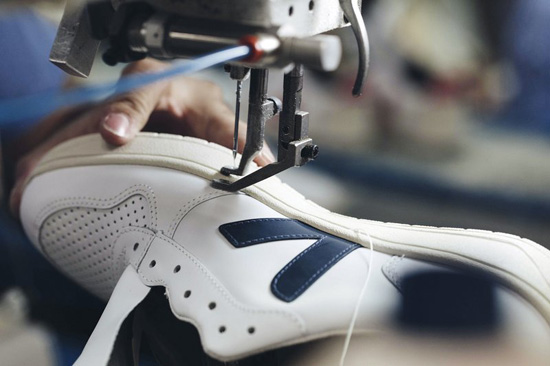要時尚,不要污染

巴西南部的一家工廠正在生產Veja運動鞋;所有的Veja工廠都遵守國際勞工組織的規定。圖片來源:Courtesy of Charlotte Lapalus
|
時尚的雋永魅力在于它可以是消費者想要的任何東西——它是表達自我的方式,是對原創和精湛工藝的頌揚,也可以是一種暫時的快樂。但如今一個無法回避的事實是,時尚也讓我們有負擔,因為它是全球污染最嚴重、浪費最嚴重的行業之一。 艾倫麥克阿瑟基金會(Ellen MacArthur Foundation)近期的報告顯示,全球紡織品生產量過去15年增長了一倍以上,而消費者每件衣服的平均持有時間僅僅是15年的一半。美國超過85%的廢棄服裝最終都被送進了垃圾填埋場,這種生產/使用/丟棄的循環代價相當高——根據《聯合國氣候變化框架公約》(UN Framework Convention on Climate Change),時尚業的溫室氣體排放量超過了國際海運和航空業的排放量總和。而且這還不算困擾全球多數快消時尚和奢侈品品牌的不道德勞動行為。 業內大規模不負責任的行為成為激發Veja靈感的部分原因,這家巴黎制鞋業的寵兒甚至早在“可持續”成為時髦口號前就已經是可持續時尚界的先鋒了。2005年,當其它品牌還在互聯網上醞釀時,弗朗索瓦-吉蘭·莫里隆和薩巴斯蒂安·寇波看到了一個帶有他們這代人實體印記的機遇:運動鞋。不像其它同品類大品牌那樣把七成的成本花在廣告上,原材料和生產只花三成,他們把所有資源都花在了生產可持續產品上(成本是其他運動鞋的五到七倍)以及制作工人身上。他們把工廠設在巴西,那里有公平貿易認證的棉花,有來自亞馬遜地區的野生橡膠,有合理支付工人工資的工廠。今天,他們還使用升級再造的羅非魚皮、回收的塑料瓶以及法蘭絨、絲綢和其他環保材料做鞋——外觀漂亮,制作精良。 |
The enduring appeal of fashion is that it can be whatever consumers want it to be—a means of self-expression, a celebration of originality and fine craftsmanship, or a temporary pleasure. But today, there’s no escaping that it comes with the burden of knowing it’s among the world’s most polluting and wasteful industries. According to recent reports by the Ellen MacArthur Foundation, global textile production has more than doubled in the past 15 years, while the average shopper holds on to clothing for half that long. Over 85% of discarded clothing in the U.S. ends up in landfills, and this cycle of make/use/waste comes at a considerable cost—the industry generates more greenhouse gas emissions than do international maritime shipping and aviation combined, says the UN Framework Convention on Climate Change. And that’s saying nothing of the unethical labor practices that have plagued many of the world’s fast-fashion and luxury brands. It’s partly this colossal irresponsibility that sparked the idea for Veja, the footwear industry’s Parisian darling that has been at the vanguard of the sustainable fashion sphere long before “sustainable” was even a buzz- word. In 2005, while other brands were being born online, Franc?ois-Ghislain Morillion and Se?bastien Kopp saw opportunity with a physical emblem of their generation: the sneaker. Unlike the big names in the category that spend 70% on advertising and 30% on raw materials and production, they devoted all their resources to a sustainably manufactured product (that costs five to seven times as much to make as other sneakers cost) and the people who make it. This happens in Brazil, where they have access to fair-trade cotton and wild rubber from Amazonia, and factories that pay their workers fair wages. Today, they also use upcycled tilapia hides; recycled plastic bottles; and flannel, silk, and other eco-friendly materials for their shoes—that are as good-looking as they are well made. |

Veja和巴西(如圖)及秘魯的有機棉花生產商直接合作。圖片來源:Courtesy of Charlotte Lapalus
|
13年過去了,Veja每年在全球銷售近200萬雙鞋,其創始人在繼續傳遞這個信息:可持續的生意是根本意義上的好生意。 這種模式適合Veja,因為它一開始的定位就是一個可持續發展品牌。擁有嵌入式供應鏈和制造設施的傳統品牌卻需要面臨更大挑戰。 業內很少有公司像開云集團(Kering)這樣直面這項任務,可持續發展已經成為了開云的一項道德準則。2017年,就在開云被《企業爵士》(Corporate Knights)的全球可持續發展企業百強榜單(Global 100 Index)評為頂尖可持續紡織品、服裝和奢侈品公司前,該集團公開宣布了2025年之前的可持續發展量化目標。其中最主要的目標是整體環境足跡減少40%。其它行動計劃涉及供應、制造、分銷和研發的每一個環節,也都在網上一一列明,這說明信息透明不再是破壞奢侈品排他性光環的敵人。 “我們在分享我們學到的知識,在開放我們創新做法的源代碼。”開云的首席可持續發展官瑪麗-克萊爾·戴維表示。 盡管曲高和寡的高端珠寶業曾經是最不可能改變的行業,集中了全球知名腕表和珠寶品牌的巴黎圣地旺多姆廣場(Place Vendo?me)仍然見證了顛覆性變化的出現。庫爾貝(Courbet)于今年5月登場,它是廣場上首個銷售100%道德、可持續產品的品牌,使用可回收、可追溯的黃金和實驗室生產的最高顏色等級的鉆石。這些鉆石比天然開采的鉆石便宜30%,天然鉆石產生的污染是實驗室鉆石的15000倍,后者是用太陽能機器制造的。世界各地的百貨商店已經開始電話下訂,當地人更是立刻表現出了興趣。品牌的聯合創始人曼努爾·邁倫表示,道德是很重要的一部分,但美感同樣重要——這就是為什么這么多只關注生態的品牌沒能贏得消費者的原因。“要想取得長久的勝利,產品必須要美。”他說。(財富中文網) 本文另一版本刊載于2019年1月的《財富》雜志,文章題目是《美與可持續》。 譯者:Agatha |
Thirteen years later, with nearly 2 million pairs sold around the world, the founders continue to push the message that sustainable business is ultimately good business. This works for Veja because it was built as a sustainable brand at its onset. But legacy brands, with embedded supply chains and manufacturing facilities, face a bigger challenge. Few in the industry are rising to the task quite like Kering, for whom sustainability has become a moral lodestar. In 2017, just before being named the top sustainable textile, apparel, and luxury goods corporation by the Corporate Knights Global 100 Index, the conglomerate publicly announced its quantitative objectives in sustainability through 2025. Chief among them: reducing its environmental footprint overall by 40%. The rest of its actions, which touch every step of the supply chain, as well as manufacturing, distribution, and R&D, are explicitly outlined online, suggesting transparency is no longer an enemy to luxury’s aura of exclusivity. “We are sharing the knowledge we gain and open-sourcing the innovations we develop,” explains Marie-Claire Daveu, Kering’s chief sustainability officer. And as unlikely as change may once have been in the rarefied world of high-end jewelry, disruption has also found its way to Place Vendo?me, the Parisian mecca of the world’s most prestigious watch and jewelry brands. Courbet launched in May as the scene’s first 100% ethical and sustainable line, using recycled, traceable gold and lab-grown diamonds of the highest color grade. These are 30% less expensive than mined diamonds—the latter producing 15,000 times the pollution of lab-grown ones, which are made with solar- powered machines. Department stores world-wide have already started calling to place orders, and local interest was instantaneous. Ethics are a big part of it, says cofounder Manuel Mallen, but aesthetics matter equally—which is why so many eco-only brands have failed to win over consumers. “For good to triumph, the product has to be beautiful,” he says. A version of this article appears in the January 2019 issue of Fortune with the headline “Beautiful and Sustainable.” |













